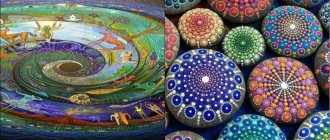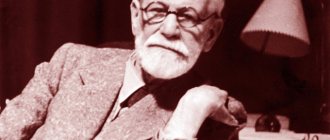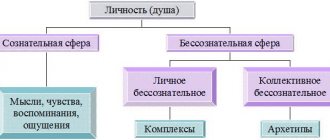Carl Gustav Jung is without a doubt an important name if we want to understand the history of psychology. His theories have been a source of both controversy and inspiration. It is not surprising that he is the founder of his own school of thought in the psychoanalytic field, the school of analytical psychology, also called complex and deep psychology.
For a long time, Jung was a student of Freud. However, he distanced himself from Freud mainly because he disagreed with his theory of sexuality. Moreover, Jung postulated the existence of a “collective unconscious” that precedes the individual unconscious.
“I know what I want: I have goals and opinions. Let me be myself, that's more than enough for me."
— Anne Frank
Jung was a restless intellectual who collected information from a variety of sources. In addition to neuroscience and psychoanalysis, Jung's theories were influenced by mythology, religion, and even parapsychology. One of his great interests was archeology, and this was probably his theory of archetypes. The theory of universal symbols present in the unconscious human mind.
Jung's personality type theory
For Carl Jung there are four basic psychological functions: thinking, believing, feeling and perceiving. In each person one or more of these functions have a special emphasis. For example, when someone is impulsive, according to Jung, it is because their “feeling and perceiving” functions take precedence over their “thinking and believing” functions.
Based on these four basic functions, Jung postulated that there are two basic character types: introvert and extrovert. Each has its own characteristics that distinguish it from the other.
Classification criteria
Jung's typology implies a psychological attitude according to which there are two types of people - extroverts and introverts. According to this teaching, the predominant mental functions are intuition, thinking, sensations, and feelings.
This typology was first presented in the work “Psychological Types,” written by Swiss psychiatrist Carl Gustave Jung in 1921. The purpose of the classification he developed was not to trivially divide people into separate groups according to any psychological characteristics. He wanted to create a special tool for a practical psychologist, with the help of which he could organize the accumulated psychological knowledge, study people, and reduce the number of errors in research.
Extroverted type
Their interests are focused on external reality, rather than on their inner world.
They make decisions by thinking about their impact on external reality, and not on their own existence.
Their actions are carried out in accordance with what others may think about them.
Their ethics and morality are built depending on what prevails in the world.
These are people who can fit into almost any environment, but they really have a hard time adapting.
They are suggestible, easily influenced and tend to imitate others. They need to be recognized by others.
Human psychotypes according to J. Holland
This method of studying character traits is suitable for determining professional activity. Holland identifies 6 psychotypes:
- realistic;
- intellectual;
- social;
- conventional;
- enterprising;
- artistic.
The realistic psychotype performs well in the field of economics and natural sciences. They are suitable for working with specific objects, which requires certain dexterity and skills.
The sphere of scientific discoveries and research is suitable for the intellectual psychotype. These people are mostly introverts with an analytical mindset; their judgments are always original and unpredictable.
Social psychotypes are extroverts who like to be in the thick of things. The professions of psychologists, doctors, and teachers are well suited for them.
The conventional psychotype is not afraid of monotonous routine work and feels good writing reports, checking documents and other paperwork. These are accountants, commodity experts, auditors, financiers.
An enterprising psychotype always strives to be a leader and manager. They are born managers, cooperators, diplomats and reporters.
The artistic psychotype is distinguished by imagination and intuition. These people can realize themselves in the humanitarian sphere: art, philosophy, linguistics, history.
Introverted character
On the other hand, the introvert type has the following traits:
They are interested in themselves, their feelings and thoughts.
They orient their behavior according to what they feel and think, even though this may be contrary to external reality.
They are not overly concerned about the impact their actions may have on their environment. They worry about everything that satisfies them internally.
They struggle to adapt to their environment and adapt to it. However, if they manage to adapt, they will do so in a creative and complete way.
The concept of psychotype
Each person has his own unique character - a set of personal qualities that identify him as a social type. However, there are some common character traits that exist among a certain group of people. They determine a person’s behavior and his attitude towards life. Psychologists have been trying to create a unified classification of psychotypes for more than a century, but at the moment there are only separate methods. We will be interested in theories:
- Jung and Hippocrates;
- Holland;
- Oldham-Maurice.
We will also consider alternative attempts to classify psychotypes, which are also of some interest.
First, let's define what a personality psychotype is. A psychotype is a person’s mental characteristics that determine an individual’s reactions to external stimuli and behavior style . The presence of common features in the style of behavior gave psychologists the basis to identify several groups (types) of people - psychotypes.
Hippocrates identified 4 types of temperament based on the influence of internal body fluids:
- sanguine;
- choleric;
- phlegmatic person;
- melancholic.
K. Jung identified two main psychotypes of personality based on the reaction to external stimuli:
- introvert;
- extrovert.
People are quite informed about the types of temperament. What does this Jungian classification mean? Extroverts are open to the world, actively interact with the external environment and draw energy from the outside. Introverts are closed to the outside world, react weakly to external stimuli and draw strength from internal reserves.
Knowing a person’s type according to Jung will help you establish a non-conflict relationship with him, based on trust and affection. It is useless to offer an introvert a noisy party, or invite an extrovert to the library reading room.
Note! Knowing your personality type will help you avoid many misunderstandings and mistakes when interacting with the world and society.
However, it should be borne in mind that there are many typologies and classifications of personality, and even psychologists are not always aware of new types. Therefore, it is most reasonable to master the most popular and proven classifications and build on them in your communication with people.
We will not consider the types of temperament according to Hippocrates, since they are quite well known to everyone. Modern psychologists are not inclined to consider the dominance of one type of temperament and its determining role in an individual’s behavior pattern. It is believed that a person’s character and behavior are influenced by all 4 types of temperament, but one of them is the leading one.
Russian psychophysiologist Pavlov agreed with Hippocrates’ classification of temperaments. However, he did not connect the characteristics of temperament with the influence of liquids on the body: Pavlov connected the type of higher nervous activity with the characteristics of the reaction of inhibition and excitation.
Classification of temperament types according to Pavlov:
- sanguine - strong and fast;
- phlegmatic - strong, but inert;
- choleric - strong and uncontrollable;
- melancholic - weak.
Pavlov's research was appreciated by the entire scientific world; his classifications formed the basis for many scientific studies of nervous activity and behavioral reactions.
Intuitive introvert
These people are extremely sensitive to the most subtle stimuli. Intuitive introverts are the type of people who can almost guess what others are thinking, feeling or wanting to do. They are creative, dreamers and idealists. They struggle with “keeping their feet on the ground.”
- 8 Physical Qualities That Reveal Your Personality
- 2 Personality Traits That Indicate You Have a High IQ
Separation of functions
To specify the descriptions of the human psyche, a Swiss psychologist introduced two new terms - additional and auxiliary function. He made a division according to which he identified two groups:
- rational - thinking, feelings;
- irrational - intuition, sensations.
If any function begins to dominate, it will suppress the others. With the further development of the dominant functions, they are joined by additional ones that begin to accompany them, helping the base to strengthen.
Formation of names
How did socionics get its name from specific personality types?
The name of the type comes from the dominant attitude (extroversion or introversion), and the two most powerful functions of the four, while the names of the functions have undergone some changes: thinking and feeling became logic and ethics, respectively, and sensation was called sensory. Rationality and irrationality are determined by the location of functions in the names of psychotypes. If we talk about rational personality types, then the first word in the name will be logic or ethics, and for irrational personality types – sensory or intuition.
The names of the 16 types were added over time by various scientists to provide a clearer accessible description of a person. The most popular names of these types are: formulaic names based on Jung’s theory, pseudonyms of famous historical figures - bearers of the designated characteristics, pseudonyms that characterize a person’s professional predisposition.
Psychotypes according to Oldham-Maurice
This psychologist-researcher proposed his classification of people’s psychotypes:
- conscientious;
- self-confident;
- devoted;
- dramatic;
- vigilant;
- sensitive;
- adventurous;
- hermit;
- altruistic;
- aggressive;
- serious.
A conscientious personality type always strives to do the job perfectly and often suffers from perfectionism. Pays attention to small details, thinks through the solution to the issue several times, and always achieves his goals.
Self-confident types are ambitious individuals aimed at moving up the career ladder. They are competitive, active and efficient. But excessive self-confidence and thirst for praise can play a cruel joke on them and turn colleagues and friends away from them.
The loyal personality type is a very sweet, sociable person who does not have his own opinion or initiative. These are obedient performers who can always be entrusted with doing important work. But without the guidance and guidance of “seniors in rank” they are not capable of anything. This position also greatly interferes with one’s personal life.
The dramatic type has dynamic emotionality, is constantly in the center of events and is interested in the latest news. Negative character traits are: the desire to be irresistible and to dramatize events.
The vigilant type sees a catch and a double bottom in everything. This is a negative component of character. In general, these people are self-sufficient, independent, careful and extremely careful.
The sensitive type does not like changes in surroundings and emotional outbursts. It is important for them to be in a familiar environment among trusted people. They have difficulty making contact with new people and do not open their souls to the open.
The adventurous type is guided by their own benefit, for the sake of which they can resort to deception and forgery. Determined people easily take any risk. Impulsiveness is their hallmark.
For hermits, solitude is the best state of mind. They love peace, quiet and contemplation. Hermits are indifferent to the world around them and do not share its interests.
The altruistic type is capable of self-sacrifice for the sake of the interests of other people. They always show concern for their neighbors, are not conflicting and are not malicious.
The aggressive type lives up to its name by being excessively demanding of others and outright cruelty. They are not afraid of difficulties, easily take responsibility and show persistence in achieving their goals.
The serious type always thinks about any step and is in no hurry to make decisions on important issues. A negative quality is self-examination and low self-esteem.
Differences between Freud's psychoanalysis and Jung's analytical psychology
How did Freud's views differ from Jung's? Let's highlight some differences.
1. The main differences between the analytical psychology of Carl Jung and Freudian psychoanalysis concern the question of the nature of libido . If Freud characterizes libido primarily in terms of the sexual sphere, then for Jung libido is vital energy in general, in which sexual activity is present only as one of the components and manifests itself in growth and reproduction, as well as in other activities that are most important for a particular person.
2. Also, Jung rejected the Freudian concept of the Oedipus complex . He explained the child's attachment to his mother by the purely everyday needs of the child, and the mother's ability to satisfy them.
As the child grows, he develops sexual needs that superimpose on the previously dominant needs for food. Jung suggested that libidinal energy takes on heterosexual forms only during puberty. He did not completely deny the presence of sexual forces in childhood, but he reduced sexuality to the position of only one of many drives in the psyche.
3. From Freud's point of view, a person is a product of his childhood experiences. For Jung, a person is determined not only by the past, but equally by his goals, expectations and hopes for the future. In his opinion, personality formation is not completed at the age of five. A person can change, sometimes quite significantly, throughout his life.
According to K. Jung, self-actualization can only be achieved in middle age, and therefore Jung considered this age (35-40 years) as a critical period for personal development - a boundary at which a person undergoes deep and beneficial transformations. Thus, for Jung, the most important stage of personal development is not childhood, as with Freud, but, on the contrary, adulthood, the time when he himself went through a mental crisis and was able to overcome it.
4. Another difference between Freud's and Jung's positions is that Jung attempted to penetrate deeper into the unconscious than Freud did. He added another dimension to the understanding of the unconscious: the innate experience of humanity as a species inherited from its animal ancestors (i.e., the collective unconscious).
Who are extroverts?
Extroverts are everyone else who is not an introvert. They are active, active, reckless and imprudent, which is why they often resemble a monkey with a grenade. This is their strength and this is their weakness.
In a free market society, extroverts feel like fish in water. They don’t need to explain that they need to be able to stand up for themselves and their ideas. They naturally strive for leadership and official status. Prizes and awards are more important to them than real achievements themselves.
Unlike introverts, extroverts relax better in the company of friends - society does not tire them at all, but on the contrary, invigorates them and infuses them with new strength. For this reason, extroverts are rarely alone - they are always looking for the company of their own kind.
Extroverts are frivolous and superficial, but at the same time light, active and proactive. Initiative does not frighten them, because they do not think ahead and do not think about the consequences. They are one of those who are strong in hindsight and bite their elbows after the fact. Because of this, introverts look at them with a wry smile - they warned...
At their best, extroverts are sociable, optimistic, and easy-going. It is extroverts who become the soul of the company, leaders of movements and activists. You can talk about anything with them and enjoy it - they always have something to tell, what news and gossip to share.
At their worst, extroverts are arrogant, opinionated, and selfish. Realists to the core, denying everything that goes beyond their understanding. They are people of the crowd and public opinion is more important to them than their own, so they often look like opportunists and sycophants.
They put their interests first and therefore easily step over anyone who stands in their way. Introverts are more likely to step over themselves, but there is no righteousness in this - only self-pity and fear of other people's indignation.
In relationships, extroverts naturally want to be in charge, and this is good when the man is an extrovert and the woman is an introvert. In all other cases, all sorts of difficulties begin due to the fact that the generally accepted idea of the relationship between a man and a woman presupposes just such a couple.
Extroverts are talkative and even talkative, and along with their manner of acting without thinking about the consequences, they can be very sharp-tongued and quick to take revenge. They are emotional and expressive to the point of hysteria, while introverts are more prone to depression and apathy.
And so on. Ask questions in the comments, and I will try to clarify any unclear points.









